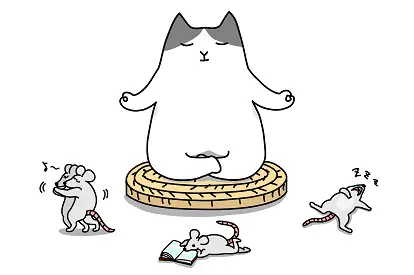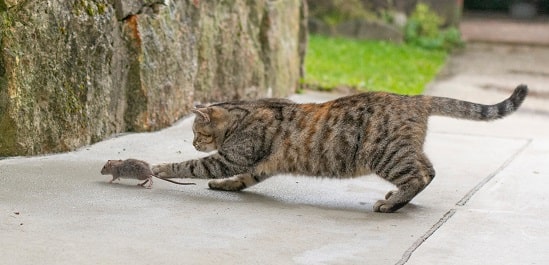
Cats are natural predators, who are born with the instinct to hunt prey. If the cat has been raised in the wild, then that instinct will develop into a survival skill. However, if your cat grew up inside with humans, it probably won’t be interested in catching or killing mice.
To understand how your cat’s hunting abilities work, we have to look at the differences between innate instincts and learned behavior.
Innate instincts are built in the animal as soon as they are born. Those instincts don’t need any outside involvement to function properly. Animals need them to survive before they can defend themselves.
For example, suckling is an innate instinct. It’s a biological need that no one needs to teach to them.
Without knowing how to suckle, kittens won’t know how to feed. That’s why they’re already born with that knowledge before they can even open their eyes for the first time.
On the other hand, learned behavior is exactly what it sounds like. It’s the opposite of innate instincts because it’s learned in time, through observation, practice, and mistakes.
For example, teaching the cat to use the litterbox is a learned behavior. If you don’t invest time into training your pet, they won’t just naturally know what to do.
It’s easy to tell which category these examples fall in, but there are some cat behaviors that are more complicated. Hunting and catching mice is one of them.
Catching Mice is More of a Learned Behavior

Hunting and chasing mice around is an innate impulse, coming from their predatory nature, but catching or killing them is something they need to learn how to do.
Yes, your cat comes from a feline family of wild predator animals that have a lot of experience with hunting their food, but pet cats live in homes, where they don’t need to do that.
The domesticated environment doesn’t push your cat to use their natural predatory abilities to kill for survival. Yes, they might chase around, but they are not encouraged to catch. Why would they if someone is already feeding them enough?
Usually, the mom is the one to teach kittens how to catch mice from an early age. That’s how the innate instinct of chasing is developed into a practiced skill of catching.
If the kitten had no one to learn how to catch mice from, then they won’t see mice as a potential food source or a potential threat.
If your cat doesn’t catch mice, it means that the cat hasn’t learned to see them the way humans do. Rather, your cat will probably treat a mouse as just another moving object or toy.
A living mouse is way more stimulating and fun than a dead mouse. So, why would they want the fun to stop?
Your cat’s desire to hunt down rodents also varies between every individual cat’s unique personality.
Some cats might find it more exciting than others. Some cats may try to make friends with the little intruders. Others may be afraid and run away from the mouse. My unbothered cat probably won’t even try to move a muscle.
They can react in all sorts of different ways.
Why Cats Don’t Kill Mice When They Catch Them
If your cat catches mice and brings them to you, but doesn’t want to kill them, there is a couple of reasons for that behavior:
- They are teaching you how to hunt
Your cat doesn’t fully understand how and where exactly you get your food from. They never see you hunting or killing, so this is an attempt for them to feed you, according to the team of FAQCats.
They will decide to capture living mice and bring them for you to practice your hunting skills on. It’s similar to what mother cats do for their small kittens.
It sounds like such a nice gesture, doesn’t it? Way cuter in theory compared to when it happens.
- They are bringing it as a gift
It can be a sign of affection and generosity. The fact that your cat wants to share this experience with you shows how much they care about you.
They show it in strange ways sometimes, but to them, it’s normal.
- They are showing off
Another theory is that cats enjoy being praised for their hard hunting work. They might want to receive a congratulations for their effort.
This might be the case if your cat doesn’t let go of the mouse and runs away after you have acknowledged them.
How to Train Your Cat to Catch Mice

If your cat doesn’t want to catch mice at all, here are the things you can do to start encouraging them to train and develop their hunting skills:
- Make sure your cat is fed
I know it may seem counter-intuitive at first. However, your cat will have no energy to hunt down anything if their stomach is empty, especially if they’re used to a domestic lifestyle.
If their body is healthy, their bones and muscles will be strong enough for the challenge against their prey.
- Play with fake mice
Use your daily playtime with your pet to play games with toys that they can chase. It will help even more if you attach a fake mouse toy to a string to make it as realistic as possible.
If you mimic a real hunting situation, it will convince your cat to practice how they would really react if they saw a mouse.
- Introduce a mouser
A mouser is a cat that already has experience with catching mice.
If it’s an option, meet your cat with a mentor that they can observe. This is the quickest and most efficient way for them to learn how to do it right, from a fellow feline.
- Reward them
When the moment finally comes, don’t let it go unnoticed.
Reinforce your cat’s behavior by showing them how proud you are of their achievement. That’s the only way they would know to continue doing it.
Give your cat a reward for the successful capture. A specific type of treat, cuddles, grooming, whatever you know for sure that they enjoy.
- Spend time outside
If it’s possible and safe, allow your cat to spend some time outside. Cats that are outdoors more often are prone to become good hunters, and more likely to catch prey, even if they have other food and water.
Don’t Rely on Your Cat to Catch Mice

Even if your cat doesn’t catch mice, it isn’t always a bad thing. There are some important dangers and downsides to using your cat as a mouse hunter, and you should be aware of them.
- Cats can expose the mouse problem, not solve it
While your pet can be taught how to catch mice, or even kill them, that doesn’t address the source of the problem. The mice will continue coming back.
They nest in small areas of your home, which not even your cat can access, such as between the walls and inside tiny cracks. Nick’s Pest Management shares that mice can also chew their way through wooden surfaces and make their own nest somewhere hidden.
If the mice find out there is a cat in the house, they will quickly learn how to adapt by finding a more secret, confined hideout away from the cat’s reach.
Catching a mouse or two will never get rid of the bigger issue. It might even make it worse. If they start traveling through the walls, it will make them way more difficult to remove.
Seek out professional extermination for a way better solution to the problem.
- Cats can contract diseases from catching mice
Cats can learn how to catch mice, but they might catch a dangerous illness in the process, too.
Rodents like mice can carry a big variety of harmful parasites and diseases – fleas, ticks, Hantavirus, Lyme Disease, and others.
Using your cat as a defense against mice means exposing it to a risk of getting ill. Not only that, but some of the illnesses can be transferred to humans as well.
Let’s not mention how much all of that will cost at the veterinarian.
At the very least, mice can bite their attackers sharply. Your cat can get injured from the hunting, especially if they don’t have much experience.
Don’t use rodent poison to get rid of the mice, either. Not only can your cat accidentally consume it, but it can also accidentally consume a mouse that has fallen for the bait.
It’s too risky of a situation to not take more serious measures.
- Mice reproduce too fast
An article on the Aptive website shares the scary news that female mice can give birth every 3 weeks and babies can mate only 6 weeks after they are born.
There’s no way one cat can keep up with the quick rate at which they reproduce. It will most likely not be enough to completely get rid of such an infestation, no matter how good of a hunter the cat is.
The more time passes, the worse the consequences will be.
Fixing the mice problem should definitely be the first priority in order to keep both you and your cat healthy.
Writer: Georgi Petkov
